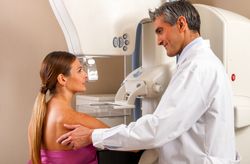
Breast cancer causes cells to multiply and form tumors in the breasts, which, left untreated, can spread to other parts of the body and create other tumors. Though life-threatening, this disease is also very treatable, particularly in its earlier stages. Breast exams ensure early detection, which can make all the difference in your diagnosis. Here’s what women’s health doctors want you to know about breast cancer detection.
Who Should Get Checked?
Detected in its earliest stage, breast cancer has a 99% survival rate. Early detection reduces the likelihood that the cancer will spread to other areas of your body, making it easier to treat.
Risk factors for breast cancer, including a family history, age, exposure to radiation, and hormone levels, vary by individual. Women over 50 are at the greatest risk, but the disease doesn’t discriminate by age or even gender. About 1 in 8 women in the U.S. will develop breast cancer, but men also have a 1% chance on developing it.
What Are the Types of Breast Exams?

Breast exams fall into two categories: self-exams and clinical tests.
Doctors recommend that adult women of all ages perform monthly self-exams. To exam yourself, apply gentle pressure to your breasts with your fingers to check for lumps, working in a circular motion around each breast.
Clinical exams are performed by your women’s health doctor. They may manually check your breasts for lumps, or schedule a mammogram. Mammograms are recommended annually for women over 40, and every 2 years for women over 50. For those at a higher risk, doctors may ask for MRIs, which scan the issue of your breasts for a more comprehensive image. Ultrasounds can also be an option to determine if lumps are cystic or solid.
Can I Prevent Breast Cancer?
While there is no way to prevent breast cancer, making certain lifestyle choices can help reduce your risk. Avoid alcohol and tobacco, which may be linked to an increased risk of breast cancer, and exercise regularly to further lower your chances of developing the disease. Since a family history of breast cancer puts you at a greater risk, make sure you’ve discussed with your family whether anyone has developed the disease.
The women’s health doctors at the Mayer Clinic in Fairbanks, AK provide regular screenings and help you assess your risk of developing breast cancer. Since 2006, they have provided primary care, women’s health services, and treatment for issues like asthma and diabetes. Learn about their staff and services online, or call (907) 457-5050 to schedule an appointment.
About the Business
Have a question? Ask the experts!
Send your question

